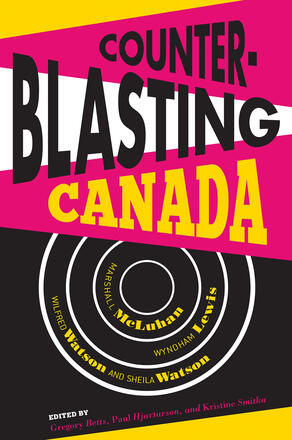
Counterblasting Canada
Marshall McLuhan, Wyndham Lewis, Wilfred Watson, and Sheila Watson
Description
In 1914, Wyndham Lewis and Ezra Pound—the founders of vorticism—undertook an unprecedented analysis of the present, its technologies, communication, politics, and architecture. The essays in Counterblasting Canada trace the influence of vorticism on Marshall McLuhan and Canadian Modernism. Building on the initial accomplishment of the magazine Blast, McLuhan’s subsequent Counterblast, and the network of artistic and intellectual relationships that flourished in Canadian vorticism, the contributors offer groundbreaking examinations of postwar Canadian literary culture, particularly the legacies of Sheila and Wilfred Watson. Intended primarily for scholars of literature and communications, Counterblasting Canada explores a crucial and long-overlooked strand in Canadian cultural and literary history.
Contributors: Gregory Betts, Adam Hammond, Paul Hjartarson, Dean Irvine, Elena Lamberti, Philip Monk, Linda M. Morra, Kristine Smitka, Leon Surette, Paul Tiessen, Adam Welch, Darren Wershler.
Reviews
"[The essays] coincide and illuminate a narrative attentive to modernist and postmodernist discourses, patterns of influence, media theory, and the future of the humanities more generally.... While every essay is rich in theory and critical reflection, it is witnessing career- and life-altering conversations unfold on every page of this book that is sometimes most engrossing. Those conversations are made all the more impressive by the archival research peppered throughout.... The model of influence presented in Counterblasting Canada is compelling because it is partly a site of conflict.... Counterblasting Canada will have obvious appeal to communications, media studies, or Canadian literature scholars (especially those interested in the recent conversationsabout later modernism, intermodernism, and the like..." Canadian Literature 232 (Spring 2017) [Full review at http://canlit.ca/article/collaborations-and-collisions-in-the-canadian-vortex]
- Jeffrey Aaron Weingarten
"Reading Counterblasting Canada one has the impression that this quartet—Lewis, McLuhan, and Wilfred and Sheila Watson—and their thinking about culture touched just about every discipline and genre available in the mid to late twentieth century…. Finally, then, these collections not only open up new critical conversations about Watson and others, they remind us that our provocative predecessors are also mentors who might help us reimagine the liberal arts in the neo-liberal university." [Full review at http://www.thebullcalfreview.ca/sheilawatson.htm]
- Kait Pinter